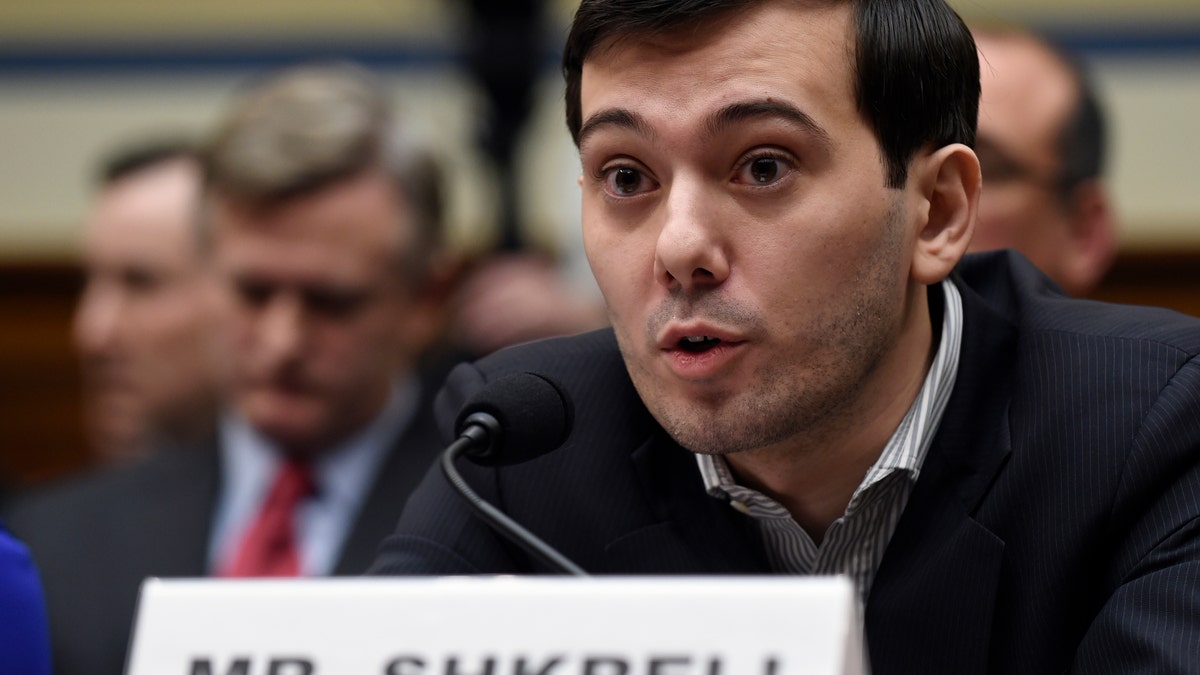
Feb. 4, 2016: Pharmaceutical chief Martin Shkreli speaks on Capitol Hill in Washington. (AP)
The former pharmaceutical executive who generated national outrage after he raised the price of a once-cheap life-saving pill to $750 was unapologetic and showed his contempt for lawmakers Thursday -- invoking his Fifth Amendment rights and rolling his eyes, as one congressman asked if he was “even paying attention.”
After his brief appearance on Capitol Hill, Martin Shkreli even took to Twitter to call lawmakers “imbeciles.”
Known for speaking his mind, the usually talkative 32-year-old declined to answer questions at the House Oversight Committee hearing, invoking his Fifth Amendment right at least a half dozen times.
At one point, he chuckled, rolled his eyes and turned his head, prompting Rep. Elijah Cummings, D-Md., to demand, “Are you even paying attention?”
“It’s not funny, Mr. Shkreli,” Cummings said. “People are dying.”
“I have never seen the committee treated with so much contempt,” Rep. John Mica, R-Fla., said.
Shkreli's lawyer Ben Brafman said his client wasn't being disrespectful but that his eyerolls and smirks were the result of nervous energy.
Brafman told Fox News that his client isn't a villan but instead "a hero."
After walking out of the hearing Shkreli tweeted: "Hard to accept that these imbeciles represent the people in our government."
Problems with the prescription drug market – price increases, lack of transparency in pricing and regulatory roadblocks for generic drug alternatives – were the focus of the hearing.
Cummings, who said he pushed for the hearing for seven months, has said “there is something about this issue that just gnaws at me 24-7.”
On Thursday, Cummings submitted a dozen letters for the record from medical associations, consumer groups and coalitions that explain how the skyrocketing prices for critical medications are preventing some of the nation’s most vulnerable patients from receiving the drugs they need.
Shkreli faces separate criminal charges of securities fraud in connection with another drug company he owned.
The lawmakers summoned him to answer for the decision that made him infamous: raising the price for Daraprim, the only approved drug for a rare and sometimes deadly parasitic infection.
The brash entrepreneur and former hedge fund manager, who pleaded not guilty after his arrest in December in New York, has been out on $5 million bail.
He walked into the packed hearing room well before the session began and met the crush of cameras. Even a few members of the House panel were swept up in the curiosity and snapped Shkreli's photo on their cellphones.
Also appearing before the lawmakers is Turing's chief commercial officer Nancy Retzlaff and the interim CEO of Canada's largest drugmaker, Valeant Pharmaceuticals Howard Schiller.
Documents from Valeant and Turing show they have made a practice of buying and then dramatically raising prices for, low-cost drugs given to patients with life-threatening conditions including heart disease, AIDS and cancer, according to excerpts released this week by the House panel.
The two companies' executives are stressing their commitment to ensuring that cost isn't a deterrent for patients who need the drugs.
Turing has taken new steps to ensure affordable access to Daraprim "for every single patient who needs the drug, regardless of ability to pay," Retzlaff said.
"To our knowledge, no patient needs to pay $750 per pill for Daraprim," she said. About two-thirds of patients get it through government programs that benefit from a discounted price of a penny a pill, Retzlaff told the panel.
Valeant has "heard very clearly" public concern over drug prices and is responding, Schiller said in his testimony. He noted the company has created a price rebate program that discounts Nitropress and Isuprel up to 30 percent in deals with big hospital purchasing groups. The two drugs most often are used by hospitals and other healthcare providers as part of procedures subject to their own price caps, Schiller testified.
The documents show how executives at both companies planned to maximize profits while fending off negative publicity over the price hikes.
Presentations by Turing executives, part of the trove of documents, show that as early as last May, the company planned to turn Daraprim into a $200-million-a-year drug by dramatically increasing its price. Turing bought the 60-year-old drug from Impax Laboratories in August for $55 million and swiftly raised its price.
Shkreli said in an email to one contact: "We raised the price from $1,700 per bottle to $75,000. Should be a very handsome investment for all of us."
But anticipating a possible backlash, the company warned in an internal memo that advocates for HIV patients might react to the price hike.
Valeant likewise identified revenue goals first and then used drug prices to reach them, committee staff said in a memo. It said Valeant believed it could repeatedly raise the prices of Nitropress and Isuprel without repercussions because they're administered by hospitals, which are less price-sensitive than consumers.
Valeant used patient assistance programs to distract attention and justify its price hikes, according to the memo.
Fox News' Michelle Macaluso and The Associated Press contributed to this report.
























